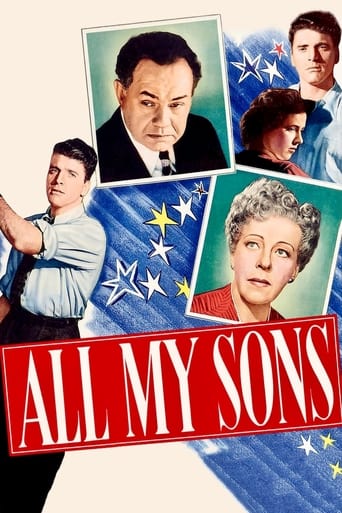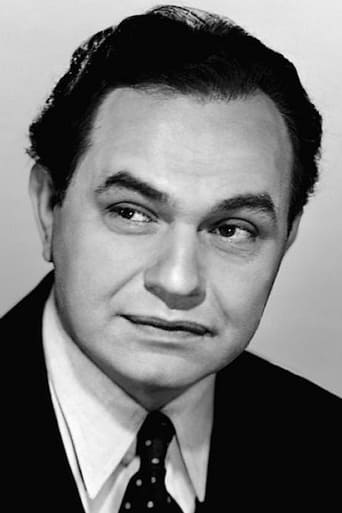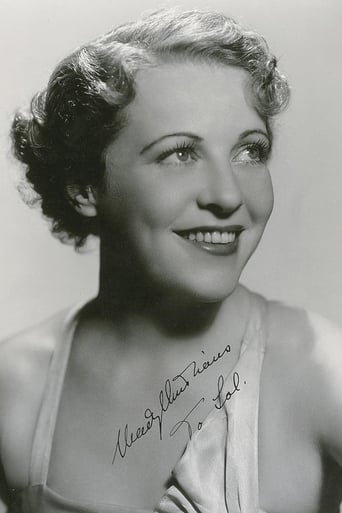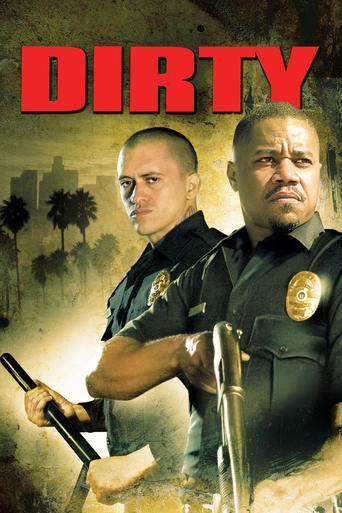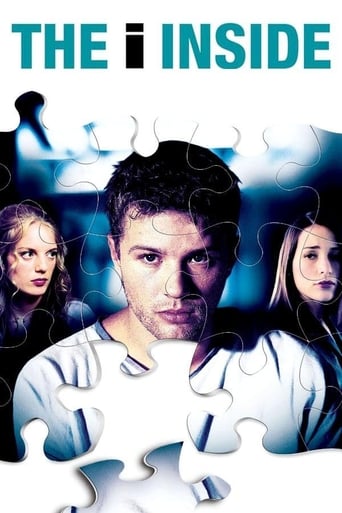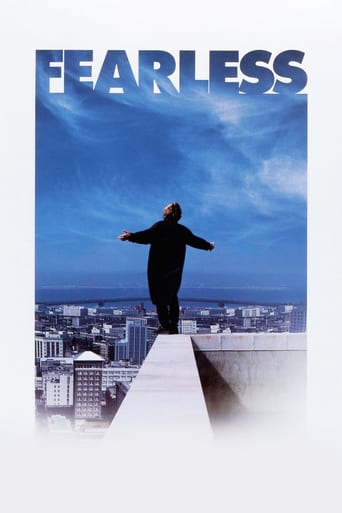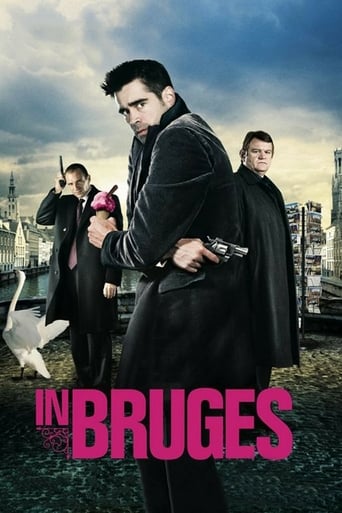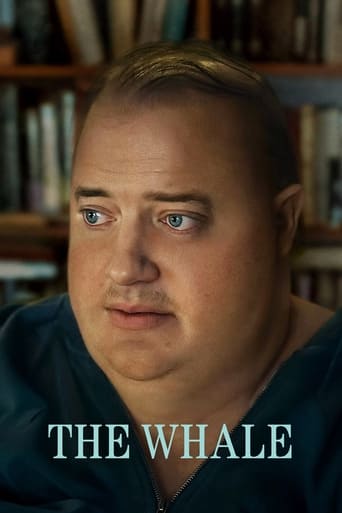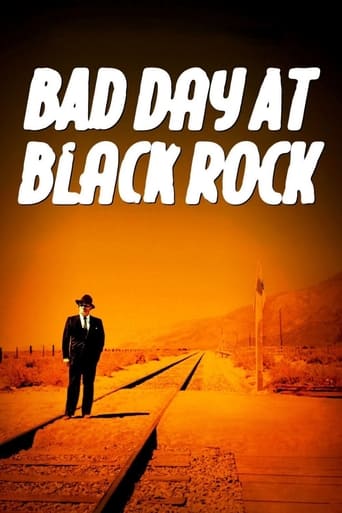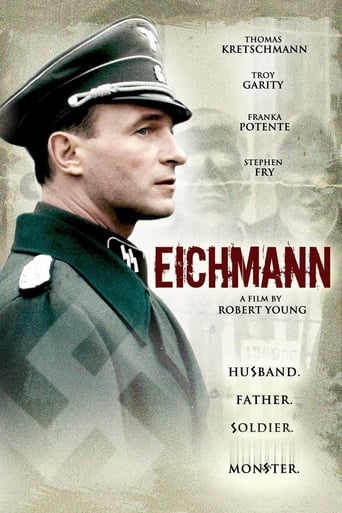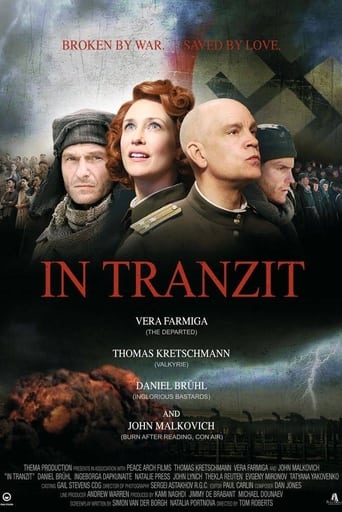All My Sons (1948)
During WWII, industrialist Joe Keller commits a crime and frames his business partner Herbert Deever. Years later, his sin comes back to haunt him when Joe's son plans to marry Deever's daughter.
Watch Trailer
Free Trial Channels
Cast


Similar titles
Reviews
Self-important, over-dramatic, uninspired.
Purely Joyful Movie!
not as good as all the hype
Excellent, Without a doubt!!
Without a doubt, the late Arthur Miller is best known for his play, Death of a Salesman. Yet, he did write some other notable plays and screen plays, and All My Sons is a little gem, very well presented as a movie here. I have seen this movie twice on TCM in the last month and the more I see it the more I love it.This drama is about a self-made man, Joe Keller (Edward G. Robinson), who owns a machine plant that produces airplane parts during World War II. He and his partner, Herbert Deever (Frank Conroy), had profited heavily from military contracts during the war. But, when it was discovered that they had sent out defective parts to keep their army contract--and that these defective parts had cost several army airmen their lives--it had put the plant under a cloud. When the scandal hit the plant, Joe was able to sidestep the scandal while his partner, Deever, was sent to jail.As the drama opens, Joe is trying to convince his son, Chris (Brut Lancaser) to join him in the business. Chris is dating Deever's daughter, Ann (Louisa Horton), who had previously been in love with Chris' older brother before he was killed in the war. Although the relationship between the Kellers and the Deevers had been strained by the plant scandal, the two Deever children, Ann and her brother Geroge (Howard Duff), remained fairly close to the Kellers. The Deever children had known Joe as their father's partner, since childhood. And, Chris, Ann, and George were practically raised together as brothers and sisters.Joe is able to put the scandal behind him and remain a proud pillar of the community. He is well liked by his neighbors, mainly for the way he had cleverly survived the scandal. In fact, he seems so untouched by the scandal that even his son, Chris, is unaware of any role that his father may have had in it. The truth about Joe's involvement in the scandal is uncovered in a sudden turn of events--events that would change everyone forever. This movie may seem dated to some. Yet, to me, it seems as topical today as it was then. All one need do is to think about the many screw-ups in Bush's War to realize that we haven't come that far in the last 60 years.I can't imagine a better performance of this play than the one presented here. This was Burt Lancaster's fifth screen appearance, and his role is more sensitive than moviegoers had seen until this point. Still, he seems up to the challenge and I'm sure this role helped to prove his versatility. Most of the women in the movie were—and are-- fairly unknown. Yet, Mady Christians was notable as Joe's wife, Kate.However, the movie is just dominated by Edward G. Robinson in his role as Joe. Joe is as important to this play as Willy Loman is to Death of a Salesman. Though I am used to seeing great performances out of Robinson, I think this is one of his very best. In fact, I think it was worthy of an Oscar in the 1949. But, alas, Robinson wasn't even nominated.
All My Sons was Arthur Miller's second produced play and first commercial success winning Tony Awards for Best play, a Tony for stage director Elia Kazan and a run of 347 performances for the year of 1947. But when the film version was made the following year the House Un- American Activities Committee was taking a long hard look at All My Sons and all who were associated with it.Universal Studios which produced the film version did more than just expand a play that had a one set setting on stage, that set being the backyard of the Keller family. A whole lot of references to the capitalist system built on greed and the notion of anything for a profit were carefully eliminated. Miller's protagonist Joe Keller becomes a monstrous aberation as opposed to a symbol. That being said the adaption by Chester Erskine is still a fine drama with the polemics trimmed.Taking over from Ed Begley who did the role on stage is Edward G. Robinson as Joe Keller the owner of a factory which had shipped some bad engine parts for airplanes and caused the crash of several of them. Robinson managed to skate responsibility and the blame fell on his partner Frank Conroy who is now in prison. Incidentally one of the changes is that on stage Conroy's character is never seen only talked about. Here Burt Lancaster as Robinson's surviving son has a new scene with Conroy visiting him in prison to learn the truth about his father as doubts of his innocence have crept into his mind.The House UnAmerican Activities Committee was all over this work in their glory days of 1948. Arthur Miller was blacklisted, so was Mady Christians who played Mrs. Keller. Elia Kazan as we know turned friendly witness for the hounds of HUAC and Edward G. Robinson in the Fifties was what was termed 'gray listed'. Not forbidden to work per se, but studios were not giving A budget work any more and wouldn't until Cecil B. DeMille hired him for The Ten Commandments.In the end Robinson has to take responsibility for what he did and he does it in the most dramatic way possible. Aficionados of Arthur Miller's work will note the similarities between the Keller and the Loman families in Miller's next production Death Of A Salesman.Possibly one day we'll get another film version that is more true to what Arthur Miller had in mind. This will due until that happens.
A moral dilemma is at the center of this excellent expose about an unscrupulous man that has been responsible for the death of young pilots during WWII. Joe Keller, a prosperous man, is by all appearances a successful businessman. Most people in his town think he got away with murder. Joe, in defending himself, points out that justice prevailed, feeling vindicated for the crime that sent his partner, Herbert Deever, to jail for a crime he is involved after following Joe's orders.The past comes to haunt Joe Keller as Annie Deever, the daughter of Herbert Deever comes to visit the Kellers. Kate Keller is suffering for Larry, her missing in action son, who after three years after the end of that conflict has not come back. Annie has fallen for Chris, the other son that now works in his father's business. Annie's visit proves to be the spark that marks the unraveling of Joe Keller, as he comes to term in facing his guilty conscience. Learning the real reason of Larry's fate in the war brings Joe to face a reality he did not want to deal with because he chose the status quo, knowing full well his own guilt in the tragedy he provoked.Arthur Miller wrote the play in which this film is based. The original cast included Ed Begley, Arthur Kennedy and Karl Malden, in the legendary production directed by Elia Kazan. The playwright took a hard look at the American Dream, as early as the boom years after the end of WWII, something clearly unheard of in those days. Mr. Miller became a new voice in the theatrical world by bringing forward issues that took a look at the core of the American society. The inspiration for the drama was based on a real story that appeared in a newspaper. Miller questioned many things Americans took for granted.The film version boasted an ensemble cast dominated by Edward G. Robinson, an actor that gave impressive accounts of the characters trusted to him to bring to life. His Joe Keller is a calculating man that feels he did not do anything wrong. Burt Lancaster plays Chris, the son that must fight for his right to marry Annie, the girl the Kellers did not want for him because of her involvement with Larry. Mady Christians was impressive as Kate, the wife who chose to go along with a husband she loved, but who she thought was guilty, all along. The weakest role in the film version was perhaps Louisa Horton who was miscast as Annie. In a way, this was her first screen appearance, so it might have been she felt insecure in connecting with her Annie. Howard Duff, Arlene Francis, Harry Morgan and the excellent Frank Conroy, are seen in minor roles.Irving Reis directed Chester Erskine's screen adaptation. The black and white cinematography was by Russell Metty and the music score is credited to Leith Stevens.This is a powerful drama.
Excellent film dealing with Arthur Miller's story of a man who sold defective plane parts to the military during World War 11 resulting in the death of many pilots.Edward G. Robinson gave us an outstanding performance as the conflicted individual, who did this for his own selfish-interests only to escape prosecution but to see his partner jailed.This is a story of intense inter-family conflicts. The partner's daughter was to be married to Joe's (Robinson's) son Larry in the film. The picture begins with the fact that Larry is missing in action. Ann, played by Louisa Horton, is now becoming engaged to Joe's other son, Chris, played with marvelous insight by a young Burt Lancaster.Mady Christians is also a standout as Joe's devoted wife, who herself is in denial that Larry is probably dead and knowing full well what her husband did was wrong.This is a terrific film dealing with moral conflict and the ultimate tragic resolution to it.You have to wonder what Edward G. Robinson had to do to be nominated for an academy award.This is Arthur Miller at his best writing. A truly American classic.

